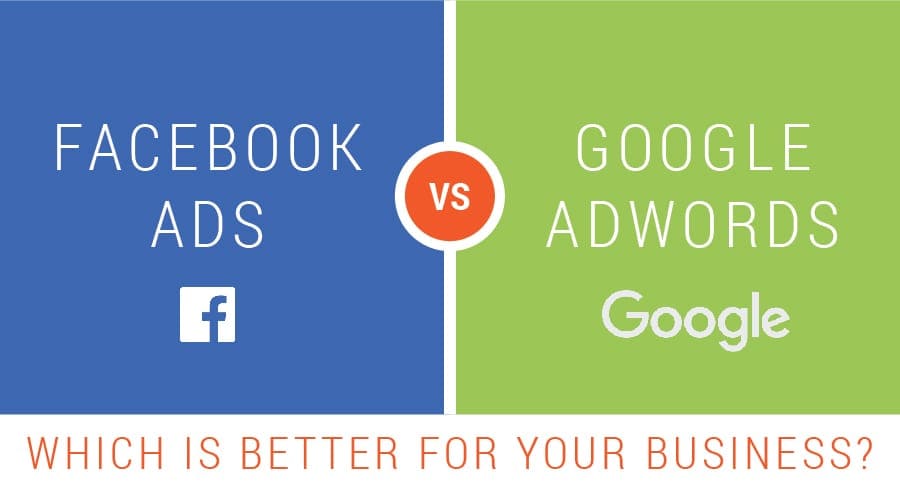Paid social advertising or PPC? Facebook Ads or Google AdWords? In head-to-head matchups, marketers aren’t always sure how to allot their budgets. That factor is complicated by a never-ending series of tweaks to the ad platforms of Facebook and Google. Here’s where things stand today.
Where’s the Advantage?
Getting the most bang for your ad-spend buck is usually the top priority for marketers. But with the uniqueness of each ad campaign, each target audience, and each business goal, there’s no simple answer about where and how to best spend your money. It depends on what you’re trying to do.
Targeting
The primary distinction between Facebook Ads and AdWords lies in how targeting works. For Facebook, the platform is set up to find your business a highly refined ideal prospect based on their past platform use. For Google, the platform serves prospects text and display ads based on their real-time searches and keywords.
While there’s often an advantage to targeting a prospect when they are actively seeking a solution, smart ad spends also matter. Since Facebook allows far more target filtering options, you get a narrower target audience, which means a lower cost per click. So in terms of targeting, Facebook comes out on top for most businesses.
Timing
However, because those Google searches are real time and if your ad is directly relevant to prospects who are ready to buy, Google PPC may be the better ad spend. Few people ready to buy are waiting for your ad to pop up on Facebook. For these well-primed customers, Google wins out.
Funnel Stage
Of course, there’s a place for those Facebook Ads in terms of lead nurturing. With most sales funnels, leads still need five to seven touches before they’re ready to buy. A well-targeted Facebook campaign could get a new crop of customers primed to buy and to buy from you. The ability to nurture leads is an important marketing budget need and one that Google PPC is less equipped to deliver on. Point to Facebook.
Customer Intent
The keyword-based platform of AdWords may not allow for as pinpointed targeting of an ideal prospect, but it is unmatched when it comes to matching product, service, or brand to a customer’s intent. Keyword and keyword phrase ad spends on AdWords can deliver highly relevant and tailored ads for an audience seeking a particular product, service, or brand. That’s something Facebook Ads currently can’t match. Google takes the ball here.
Engagement
Do your customers need some feedback before they buy? Are you selling in a tight market with other competitive brands, and you need to distinguish yourself? Good luck doing that without social. Facebook wins out when it comes audience engagement. Brands can interact with prospective customers, build rapport and trust with an audience, and overcome sales objections in near real time. A Facebook Ad can get prospects on your page to start the engagement process. AdWords can’t.
Local Market Sales
Of course, if people are on their phone — looking for anything from a local emergency plumber to an Italian restaurant to head to for dinner — Google has the advantage. Few prospective customers are going to start looking through their newsfeed for relevant Facebook Ads in that situation. We know that mobile search has been bigger than desktop search for more than a year, meaning those mobile-ready localized Google ads are going take the prize here.
Ad Quality
Utility has its purpose, but as any advertiser knows, the best ads persuade on far more than logic and necessity. Beautiful, vivid, dynamic ads win more attention. Social media wins out here, with the ability to spend your ad dollars on graphics, photo imagery, and even video via sponsored posts. Google’s text and link ads offer little more than a bolded headline. Regarding visual appeal, Facebook wins out.
Product Positioning
Many industries are so competitive that a pretty picture won’t cut it. To position your product or service against a competitive market like insurance or finance, you need to be on the SERPs page — preferably just below or even above your biggest competitor. Google’s AdWords can help you gain more such visibility for your business. Then, it’s up to you to offer a unique value proposition with your ad text to win clicks and sales. Google is far more suited to such a marketing goal than Facebook, winning another point here.
Which Platform Wins Overall?
If you’ve kept score, you know this game is a draw. Both Facebook Ads and Google AdWords offer plenty of bang for your buck — depending on your unique marketing situation. Know that even with the constant algorithmic and product updates, both platforms can perform well for many different types of businesses. The key is to know your own needs and the needs of your ideal customer. Then, you’ll be ready to choose the right digital paid advertising tool to get the job done.
